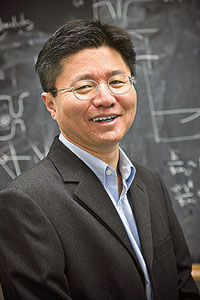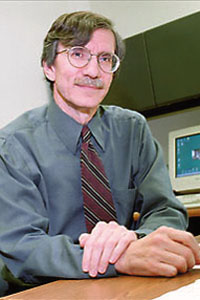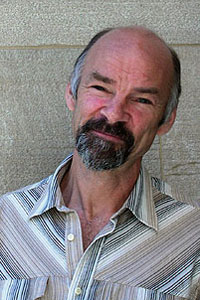Three faculty members receive Guggenheim fellowships for research
By Steve Koppes, William Harms and Catherine GianaroNews Office, Medical Center Public Affairs
 Woowon Kang | |
 John Lucy | |
 Trevor Price | |
Three University faculty members have received 2005 Guggenheim fellowships in the 81st annual U.S. and Canadian competition sponsored by the John Simon Guggenheim Memorial Foundation. The foundation grants funding to fellows based on “distinguished achievement in the past and exceptional promise for future accomplishment.”
The 2005 Guggenheim fellows from the University are Woowon Kang, Associate Professor in Physics and the College, John Lucy, the William A. Benton Professor in Comparative Human Development, Psychology and the College, and Trevor Price, Professor in Ecology & Evolution.
This year’s fellowship winners, announced by Guggenheim Foundation president Edward Hirsch, include 186 artists, scholars and scientists selected from more than 3,000 applicants for awards totaling $7,112,000.
Decisions are based on recommendations from hundreds of expert advisers and are approved by the foundation’s board of trustees, which includes seven members who are past fellows of the Guggenheim Foundation.Woowon Kang, Associate Professor in Physics and the College, will devote his Guggenheim fellowship to developing new experimental methods for studying the physics of correlated electrons, the manner in which electrons spontaneously organize themselves in scientifically interesting ways. Superconductivity and magnetism are common examples of correlated electron states, “but now there are more interesting ones, more novel ones that people want to study,” Kang said.
These include the quantum Hall effect, which governs the behavior of electrons under the influence of powerful magnetic fields. “Often people call it a new state of matter forming because this is a very important and unique representation of electronic material in nature,” Kang said.
Although Kang studies solids, at the subatomic level their constituents, electrons and other particles, behave dynamically, like the ripples that form across the surface of a pool of water. With his fellowship, Kang will try to figure out a way to study these quantum mechanical ripples.
Such a method also would be useful for investigating the unusual properties of Luttinger liquid, a unique kind of matter that forms in only one dimension. In Luttinger liquid, electrons, which under most circumstances are indivisible, behave as if they have been broken apart.
“This is what solid-state physics is all about, to look for interesting properties, especially electronic properties, which may be used for technological applications or to better understand the fundamental laws of nature,” Kang said.
From 1995 to 2000, Kang studied superconductors on a fellowship from the David and Lucile Packard Foundation.He received his Ph.D. from Princeton University in 1992 and his B.S. in physics, with magna cum laude and Phi Beta Kappa honors, in 1988 from the University of California, Los Angeles. He joined the Chicago faculty in 1994, following an appointment as a postdoctoral scientist in the Semiconductor Physics Research Department at AT&T Bell Laboratories.
John Lucy, the William Benton Professor in Comparative Human Development, Psychology and the College, will use his fellowship for a project titled “The Impact of Language Differences on Intellectual Development.”
A leading figure in the study of how language affects thought, Lucy will build on earlier work with adults and advance an approach to the topic that brings together theoretical perspectives from American linguistic anthropology, Soviet historical psychology and contemporary cognitive developmental psychology. The approach will be illustrated with an extended case study that compares the development of American English and Yucatec Maya children.
Lucy has done extensive fieldwork in Mexico, where he has studied language, cognitive development and other areas of interest, including religious ritual. He is working with Suzanne Gaskins of Northeastern Illinois University on the project examining grammatical categories and cognitive development.
He also has written Language Diversity and Thought: A Reformulation of the Linguistic Relativity Hypothesis (1992) and Grammatical Categories and Cognition: A Case Study of the Linguistic Relativity Hypothesis (1992).
Lucy joined the Chicago faculty in 1996, and served as Master of the Social Sciences Collegiate Division, Deputy Dean of the Social Sciences Division, and Associate Dean in the College between 1999 and 2002. In 2002, he was Interim Dean of the Social Sciences Division.
He earned a B.A. in mathematics from Pomona College in 1972, and a Ph.D. from the University’s Committee on Human Development in 1987. He served on the faculty of the University of Pennsylvania’s anthropology department before joining the Chicago faculty.
Trevor Price, Professor in Ecology & Evolution, studies the roles of sexual selection and natural selection in speciation. Price plans to complete a book on bird speciation with the support of the fellowship. “It’s a summary of the field that I’ve been working in for 30 years,” Price said.
Most of his fieldwork is done in India and is focused on a single genus of birds, the Phylloscopus warblers, which breed in the Himalayas and temperate Asia and in winter in tropical Asia. He has been researching this group as a model for the way by which speciation occurs on continents.
The book will draw on this research but also provide a literature survey, he said. It is aimed at researchers studying evolutionary biology, as well as ornithologists.
In addition to his academic research, Price is actively involved in conservation issues in India. He has published nearly two-dozen papers on Indian natural history in both Indian and popular journals.
His most recent papers include “Adaptive Phenotypic Plasticity and the Successful Colonization of a Novel Environment,” published in American Naturalist; “Speciation in a Ring,” published in Nature; and “Speciation by Distance in a Ring Species,” published in Science.
He earned a B.A. from the University of Cambridge and a Ph.D. from the University of Michigan. He was a postdoctoral fellow at the University in 1984, when he also received the American Society of Naturalists Young Investigator’s Award. He held additional posts at the University of Houston and the University of California, San Diego, before returning to Chicago in 2003.
![[Chronicle]](/images/sidebar_header_oct06.gif)